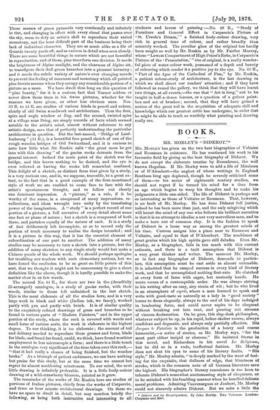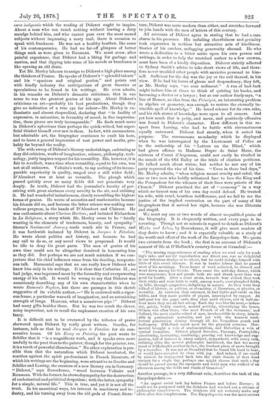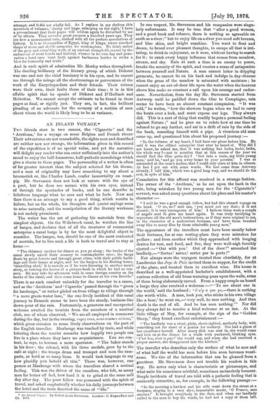BOOKS.
MR. MORLEY'S " DIDEROT."
Mu. MORLEY has given us the two best biographies of Voltaire and Rousseau in existence. He has continued his work in his favourite field by giving us the best biography of Diderot. We do not except the elaborate treatise by Rosenkranz, the well known Hegelian. If Mr. Morley were to add a life of Mirabeaa or of D'Alembert—the neglect of whose writings in England. Bentham long ago deplored, though he severely criticised some of them—to his series of eighteenth century studies, we should not regret if he turned his mind for a time from an age which begins to warp his thoughts and to make his judgments a little one-sided. The life of Diderot is perhaps not so interesting as those of Voltaire or Rousseau. That, however, is no fault of Mr. Morley. He has done Diderot full justice, indeed he has been more than just, and the only misgiving which will haunt the mind of any one who follows his brilliant narrative is that it is an attempt to idealise a not very marvellous man, and to make a hero out of common clay. It is the fashion to speak of Diderot in a loose way as among the greatest minds of his time. Custom assigns him a place near to Rousseau and Voltaire, and equal to that of D'Alembert. The semblance of great genius which his high spirits gave still deludes. Even Mr. Morley, as a biographer, falls in too much with this current estimate, and there is a tacit assumption that Diderot is a very great thinker and writer. The moment Mr. Morley, or in fact any biographer of Diderot, descends to particu- lars, this assumption must be cast aside as almost untenable. It is admitted that he essayed success in every kind of literary work, and that he accomplished nothing first-rate. He clutched at every form of fame with eager, but unsteady hands. He wrote verses of a contemptible order. He was always striving in his writing after an easy, airy strain of wit ; but he who lived in an atmosphere of esprit, where a man learned to speak and write with good-taste as naturally as a lady in "good society" learns to dress elegantly, always to the end of his days indulged in lumbering farce, and could never aspire to be eloquent without breaking out into rant, and pouring out streams of viscous declamation. On he goes, this slap-dash philosopher, whatever subject be up, in his rapid, helter-skelter course, always confident and dogmatic, and always only partially effective. His Jacques le Fataliste is the production of a heavy and coarse humourist,—a series of stories, as Mr. Morley says, "for the most part either insipid or obscene." He imitated Sterne in this novel, and Richardson in his novel La Religieuse, but he did so in a rude, ineffectual fashion. Mr. Morley does not shut his eyes to some of his literary faults. " His style," Mr. Morley admits, " is deeply marked by the want of feel- ing for the exquisite, that dullness of edge, that bluntness of stroke, which is the common note of all German literature save- the highest. His biographer's literary conscience is too keen to tolerate Diderot's somewhat auctioneering style of eloquence, or to be satisfied with his fumbling manner when he handled delicate moral problems. Admiring Vauvenargues or Joubert, Mr. Morley could not sincerely admire Diderot. But we miss a little the * Diderot and the Encyclopedists. By John Morley. Two Volumes. London: Chapman and Hall. smva indignatio which the reading of Diderot ought to inspire. About a man who can touch nothing without leaving a dirty smudge behind him, and who cannot pass over the most sacred subjects without impressing a nasty trail, there is occasion to speak with frankness. He was not a healthy heathen, like some of his contemporaries. He had no far-off glimpses of better things such as were given to Rousseau. We must avow, after painful experience, that Diderot had a liking for garbage and carrion, and that dipping into some of his novels or brochures is like opening an old drain.
Yet Mr. Morley labours to assign to Diderot a high place among the thinkers of France. He speaks of Diderot's " splendid talents " and his " spacious and original genius," and points out with kindly industry the anticipations of great theories or speculations to be found in his writings. He even admits, in his remarks on Diderot's dramatic criticisms, that in one sense he was the greatest genius of his age. About Diderot's criticisms on art—probably his best productions, though they give no indication of a true eye for colour—Mr. Morley is en- thusiastic and almost rhapsodical, declaring that "in facility of expression, in animation, in fecundity of mood, in fine improvisa- tion, these pieces are truly incomparable." He finds much more in Diderot's aphorisms than perhaps the quick-witted, but super- ficial thinker himself ever saw in them. In fact, with unconscious, but admirable art, the biographer continues to exalt his hero, and to leave a general impression of vast power and merits, pro- bably far beyond the reality.
The wide sweep of Diderot's literary undertakings, embracing as they did criticism, works of imagination, science, philosophy, tech- nology, justly inspires respect for his versatility. His, however, it is fair to recollect, was a time when versatility, equal to his own, was not at all unknown. Voltaire's work, to say nothing of its incom- parable superiority in quality, ranged over a still wider field ; D'Alembert was at least as versatile. The plough which passed quickly over so many fields did not penetrate very deeply. In truth, Diderot had the journalist's faculty of per- ceiving with great alertness every novelty in the air, and utilising it. He had wonderful imitativeness, closely resembling the highest forms of genius. He wrote of acoustics and mathematics because his friends did so, and because the latter science was making mar- vellous progress, in the hands of D'Alembert and Clairaut. He was enthusiastic about Clarissa Marlowe, and imitated Richardson in La Religieuse, a story which Mr. Morley owns to be " fatally wanting in the elements of tenderness, beauty, and sympathy." Sterne's Sentimental Journey made much stir in France, and it was forthwith imitated by Diderot in Jacques le Fataliste. He wrote about politics and history, not because he had any call to do so, or any novel views to propound. It would be idle to deny his great parts. The men of genius of his own time could not be altogether deceived in honouring him as they did. But perhaps we are not much mistaken if we con- jecture that his chief influence came from his dazzling, tempestu- ous talk. Marmontel says that no one really knew Diderot who knew him only in his writings. It is clear that Catharine II., no bad judge, was impressed most by the fecundity and overpowering energy of his talk. It would be wrong to say that Diderot was consciously describing any of his own characteristics when he wrote Rameau's Nephew, but there are passages in this sketch suggestive of its voluble author,—" He is endowed with a vigor- ous frame, a particular warmth of imagination, and an astonishing strength of lungs. Heavens, what a monstrous pipe !" Diderot had many gifts besides these. But he was too much the clever, noisy improviser, not to recall the unpleasant creation of his own fancy.
It is difficult not to be overawed by the tributes of praise showered upon Diderot by really great writers. Goethe, for instance, tells us that he read Jacques le Fataliste for six con- secutive hours. Of his Essay on Painting the poet wrote to Schiller that it " is a magnificent work, and it speaks even more usefully to the poet than to the painter, though for the painter, too, it is a torch of powerful illumination." No other explanation is pos- sible than that the naturalism which Diderot inculcated, the reaction against the spirit predominant in French literature, of
which his writings are the beginning, were attractive to Goethe and Schiller and Leasing, the creators of a new literary era in Germany. "Diderot," says Rosenkranz, "stood between Voltaire and Rousseau. With the former, he showed sympathy for the destruction of ecclesiastical and polititical despotism; with the latter, sympathy for a simple, natural life." This is true, and yet it is not all the truth. In his anarchical ways, his interest in machinery and in- dustry, and his turning away from the old gods of French litera- ture, Diderot was more modern than either, and stretches forward to join hands with the men of letters of this century.
All accounts of Diderot agree in stating that he had a rare charm in his presence. His unfailing cheerfulness and geniality took expression in reckless but attractive acts of kindliness. Stories of his careless, unflagging generosity abound. He who
wrote a dedication to a bitter satire upon his own person and writings, in order to help the wretched author to a few crowns, must have been of a kindly disposition. Diderot strictly adhered' to Sydney Smith's advice to take short views of life, and there- fore never troubled other people with anxieties personal to him- self. Sufficient for the day was the joy or the evil thereof, in his- view. If lie had his hours of gloom and despondency, they left, as Mr. Morley says, " no sour sediment." A run of bad-luck might induce him at times to think of quitting his books, and becoming a doctor or a lawyer ; but as our author finely says, " a line of Homer, an idea from the Principia, an interesting problem
in algebra or geometry, was enough to restore the eternally in- vincible spell of knowledge." He loved science for its own sake, and his rich stores of knowledge were open to all corners. And yet how much that is petty, and mean, and positively offensive was found in Diderot's character. How different in this re- spect from Leming, who had to battle with circumstances equally untoward. Diderot lied stoutly, when it suited his purpose. The consummate mendacity which he displayed when he was interrogated by the Lieutenant of Police as to the authorship of his " Letters on the Blind," which had given offence to Madame Dupre de Saint Maur, the mistress of Count d'Argenson, could not easily be rivalled in the annals of the Old Bailey or the trials of election petitions. Ile talked much about virtue, but neither he nor any of his party reproved the vice of his time. " Even in these bad days,' Mr. Morley admits, " when religion meant cruelty and cabal, the
one or two men who boldly withstood face to face the Kiug and the Pompadour for the vileness of their lives were priests of the Church." Diderot practised the art of " economy" in a way which no honest man of his own day could defend. He treated his wife, with cruel, heartless indifference, and we fail to see the justice of the implied contention on the part of many of his
biographers that it served her right, because she was illiterate and stupid.
We must say one or two words of almost unqualified praise of the biography. It is eloquently written, and every page is in-
teresting. Though not so minute in regard to details as Diderot's Werke and Lehen, by Rosenkranz, it will give most readers all they desire to know ; and it is especially valuable as a study of the worth and effect of the work of the Encyclopaedists. We quote
two extracts from the book the first is an account of Diderot's manner of life at D'Holbach's country-house at Grandval :—
" The musing suggestiveness of reading when we read only for read- ing's sake, and not for reproduction nor direct use, was as delightful to our laborious drudge as to others, but ho could indulge himself with little of this sweet idleness. It was in harder labour that he passed most of his mornings. Those hours of work achieved, ho dressed and went down among his friends. Then came the mid-day dinner, which was sumptuous ; host and guests both ate and drank more than was good for health. After a short siesta, towards four o'clock they took their sticks and went forth to walk, among woods, over ploughed fields, up hills, through quagmires, delighting in nature. As they wont they talked of history, or politics, or chemistry, of literature, or physics, or morality. At sundown they returned, to find lights and cards on the tables, and they made parties of piquet, interrupted by supper. At half-past ton the game ends, they chat until eleven, and in half-an- hour more they are all fast asleep. Each day was like the next,—indus- try, gaiety, bodily comfort, mental activity, diversifying the hours. Grimm was often there, ' the most French of all the Germans,' and Galiani, tbo most nimble-witted of men, inexhaustible in story, inimit- able in pantomimic narration, and yet with the keenest intel- lectual penetration shining through all his Neapolitan prank and buffoonery. D'Holbach cared most for the physical sciences. Mar- montel brought a vein of sentimentalism, and Helvaius a vein of cynical formalism. Diderot played Socrates, Panurge, Pantoehile; questioning, instructing, combining; pouring out knowledge and sug- gestion, full of interest in every subject, sympathetic with every vein, relishing alike the newest philosophic hardihood, the last too merry mood of Dllolbach's mother-in-law, the freshest piece of news brought by a traveller. It was not at Grandval that he found life hard to boar, or would have accepted its close with joy. And indeed, if one could by miracle be transported back into the sixth decade of that dead century for a single day, perhaps one might choose that such a day should be passed among the energetic and vivid men who walked of an afternoon among the fields and woods of Grandval."
Another passage, in a very different vein, describes the task of the Encyclopmdists
"An urgent social task lay before France and before Europe ; it could not be postponed until the thinkers had worked out a scheme of philosophic completeness. The thinkers did not seriously make any effort after this completeness. The Encyclopaedia was the most serious
attempt, and it did not wholly fail. Aa I replace in my shelves this mountain of volumes, ' dusky and huge, enlarging on the sight,' I have a presentiment that their pages will seldom again be disturbed by me er by others. They served a great purpose a hundred years ago. They are now a monumental ruin, clothed with all the profuse associations of history. It is no Ozymandias of Egypt, king of kings, whose wrecked shape of stone and sterile memories wo contemplate. We think rather of the grey and crumbling walls of an ancient stronghold, reared by the endeavour of stout hands and faithful, whence in its own day and gene- ration a band once went forth against barbarous hordes to strike a blow for humanity and truth."
And in such spirit of admiration Mr. Morley writes throughout. The dazzling brilliancy of the literary group of which Diderot was one and not the chief luminary is in his eyes, and he cannot see through the mirage all the shortcomings or perversions of the work of the Encyclopaedists and their friends. Their virtues were their own, their faults those of their time ; it is in this affable spirit that he speaks of Diderot and D'Holbach and Helvetius. We cannot accept the estimate to be found in these pages as final, or rigidly just. They are, in fact, the brilliant pleading of an advocate for the memory of a section of men about whom the world is likely long to be at variance.




































 Previous page
Previous page